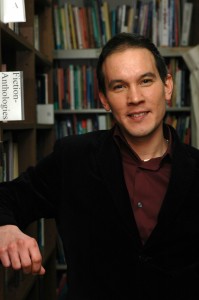Justin’s Japan: Interview with “Japanamerica” Author/JET Alum Roland Kelts on “Monkey Business”
By JQ magazine’s Justin Tedaldi (CIR Kobe-shi, 2001-02) for Examiner.com. Visit his page here to subscribe for free alerts on newly published stories.
Taking its name from the immortal Chuck Berry tune, the debut English-language edition of Monkey Business: New Voices from Japan is based on the annual Tokyo-based Japanese literary magazine founded in 2008 by award-winning translator, scholar, editor and author Motoyuki Shibata, one of Japan’s best known and most highly regarded translators of American fiction. The first installment offers poetry, Kafka-adapted manga, a wide-ranging, in-depth interview with Haruki Murakami, and much more. And despite its mischievous title, twenty-five percent of all Monkey Business sales will go toward the Nippon Foundation/CANPAN Northeastern Japan Earthquake and Tsunami Relief Fund.
Roland Kelts (Osaka-shi, 1998-99) is the author of 2006’s Japanamerica: How Japanese Pop Culture Has Invaded the U.S. and a curator and editor for Monkey Business. A weekly columnist for The Daily Yomiuri, commentator for National Public Radio, and teacher of Japanese popular culture at New York University and the University of Tokyo (he splits his time between both cities), Kelts is back in town this week for the new book’s launch, beginning April 30 at Asia Society, May 1 at BookCourt in Brooklyn, and May 3 at Japan Society. I caught up with Kelts during his recent appearance at Seattle’s Sakura-Con for this exclusive interview.
How did you get involved as an editor and curator for this book?
My dear friend, Motoyuki Shibata, Japan’s premier translator of American literature, talked to me two years ago about publishing an English-language version of Monkey Business, his literary magazine. As an editor at A Public Space, a literary magazine based in Brooklyn, I was keen to build another bridge between the two countries. I talked at length with Brigid Hughes, the founding editor of A Public Space, and she was interested. Then we received a grant from the Nippon Foundation, and the Japan Foundation, the Asia Society and the Japan Society all supported our project. I am deeply grateful to all parties involved.
What can readers expect from the book?
The freshest, newest, most exciting contemporary literature, poetry and manga from Japan, plus some American voices, like Barry Yourgrau, who have emerged as major American authors in Japan.
How did you select the pieces to be selected for the English version?
Motoyuki Shibata, Ted Goosen and major translators like Jay Rubin (Haruki Murakami’s translator) and Michael Emmerich all created the final manuscript. Shibata and Goosen then sent it to me and Brigid Hughes, and we had several conversations in order to select the best material for an American readership.
What are the biggest challenges of translating and editing Japanese creative writing into English?
It’s not as simple as it sounds. You need to choose the material that will speak to American readers, who, after all, are limited and defined by their cultural context. Not every successful book in Japan will speak to American readers. You need cultural authorities on both sides of the Pacific Ocean to make a valuable publication.
You’ve been working on a novel of your own called Access for years now. What can you tell us about it, and how’s it coming along?
Very close to completion. I think it’s a masterpiece, but I’m partial, of course. It’s a cross-cultural narrative built upon sex and longing—both close to my heart.
As a participant of Japan’s international exchange-based JET Program, what were your biggest takeaways from your experience that you’ve applied to your career today?
I learned how to live and work in Japan—an invaluable lesson.
Read the rest of the interview here.



Comments are closed.